开放英语3 (Unit 1)导学课件
人教版英语必修三Unit1Reading课件

Obon (盂兰盆) in Japan
Columbus Day
P 4. Harvest Festivals Harvest and Thanksgiving Festival Mid-Autumn festival
P 5. Spring Festivals Spring festival Carnival Easter Cheery Blossom Festival
Festivals Activities
Obon
The Day Halloween
of the Dead
Cleaning Eating
Children
_g_r_a_v_e_s; cakes with _d_r_es_s__u_p
lighting _b_o_n__e_s on _i_n_c_en__se_ them; and lamps; offering
Reading
FESTIVALS AND CELEBRATIONS
Skimming
What festivals are mentioned in each paragraph P1. Ancient festivals celebrate the end of the cold weather, planting in spring and harvest in autumn; celebrate when hunters catch animals.
New words
starve: 饥饿 origin: 起源 ancestor: 祖先 Obon: 盂兰盆节(日本) grave: 坟墓; 墓地 incense: 熏香 in memory of: 纪念 feast: 节日; 盛宴
skull: 头骨 dress up: 打扮; 盛装 play a trick on: 搞恶作剧 award: 奖品 rooster: 公鸡 energetic: 充满活力的 carnival: 狂欢节 parade: 游行
开放英语 3 unit 1 talking about yourself
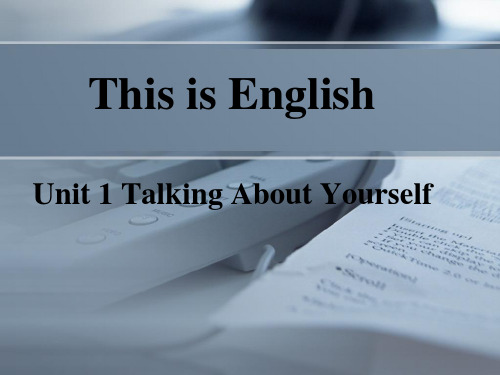
定语从句 1(Attributive Clause)
• • • •
LOGO
1.定义:在复合句中修饰名词或代词的从句。 2.先行词:定语从句所修饰名词称为先行词。 3.引导定语从句的连词: 关系代词:which, that, who, whom, whose 关 系副词:when, where, why • 4.解决定语从句的三个关键: • 找先行词,看先行词在从句中充当的句子成分, 选关系代词或关系副词。 • The book which you lent me was interesting.
• every month, often, once a week等.
现在进行时(Present Continuous )
• • • • • • • • • • • • •
LOGO
1.形式:主语+am/is /are + doing 2.基本用法: 表示此刻正在进行的动作: What are you doing here? 表示现阶段的正在进行的动作或状态: We are doing an experiment this month. They are playing for the same team this season. 表示安排或计划好的将来的动作(常用方位动词 come, go, arrive, start, stay). He is coming here next week. 3.标志: now, at present, look, listen 状态动词通常不用于进行时态, Be, 感官、情感和思维活动
Language Focus: 连接词
LOGO
• And 顺连 “和” Tom left for Beijing yesterday, and he will be back next week. • But 转连”但是” he didn’t see me, but I saw him. • Although 表示让步Although she was n’t watching the match, she was listening to the radio. • With 表示 “有” China is a large country with long history. • 代词 用代词避免重复: Mary was born in 1984,She started school at six.
Unit3Topic1SectionAPPT课件
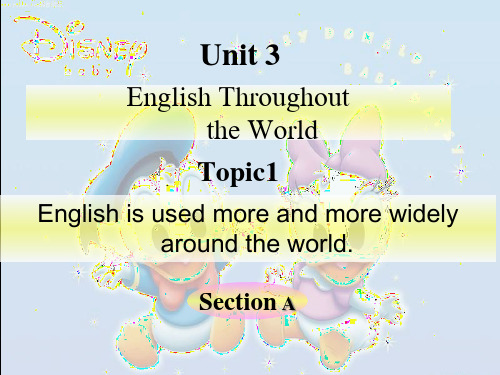
Mickey Mouse
Donald Duck
Listen to the dialogue in 1a and answer the questions. 1. Where will W and his parents visit?
2. Is W good at English?
Listen to the dialogue in 1a and answer the questions.
Children use computers. Computers are used by children.
The students plant many trees every year.
Many trees are planted by the students every year.
各种时态的被动语态 1. 一般现在时 am/is/ are +P.P 2. 一般过去时 was/were + P.P 3. 一般将来时 will +be+ P.P 4. 现在进行时 am/is/ are +being +P.P 5. 过去进行时 was/ were +being +P.P 6. 现在完成时 have/has +been +P.P
You Know, The More Powerful You Will 自己的故事里成长
Thinking In Other People‘S Speeches,Growing Up In Your Own Story
讲师:XXXXXX XX年XX月XX日
Unit 3
English Throughout the World Topic1
English is used more and more widely around the world.
人教版新课标 必修三第一单元M3Unit1 reading language point 课件(19张)PPT (1)

9. look forward to 期望;盼望;期待
1) 我非常盼望放假。
I am very much looking forward to the holidays.
2) 我盼望着收到你的来信。 I am looking forward to hearing from you!
注意: to是介词, 后跟n. / pron. / v.ing
She's lonely, and starving for friendship. The motherless children were starved of/ were starving for affection.
没妈的孩子渴望母爱. n. starvation die of __________ starvation
2. My sister was against my suggestion while my brother was ___________ in favor of it.
in charge of 3. I am ______________ the class this term.
in place of cream in this 4. You can use milk __________ recipe(食谱). in need of some fresh air. 5. I am ___________
The names of many heroes are celebrated by the poets.
词语辨析:celebrate, congratulate celebrate后常接日期, 事情或场合 congratulate后常接人 为某事而祝贺某人 你们国家的人是怎样庆贺新年的?
人教版高中英语必修三 unit1 reading 公开课课件 (共28张PPT)
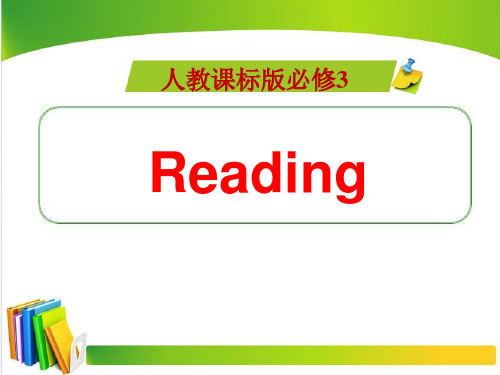
几何公差
知识目标
1.掌握几何公差特征项目的名称、符号; 2.掌握几何公差特征项目的公差带、含义及标注 方法; 3.掌握几何公差的选用原则; 4.理解独立原则、相关原则。
课程 任务
技能目标
课程 任务
能通过识读零件图,并能分析零件图中几何公 差项目及符号的含义。
0
任务描述
如图3-15所示为曲轴的零件图,识读零件图,并分析图中 所有几何公差项目及其符号的含义。
圆柱度是限制实际圆柱面对理想圆柱面变动量一项综合指标。
二 几何公差及公差带
(一)形状公差及公差带
二 几何公差及公差带
(一)形状公差及公差带
二 几何公差及公差带
(一)形状公差及公差带
二 几何公差及公差带
(一)形状公差及公差带 5.轮廓度公差 (1)线轮廓度 线轮廓度是指对曲线形状精度要求,是限制实际曲线对理想 曲线变动量的一项指标。
二 几何公差及公差带
(一)形状公差及公差带 5.轮廓度公差 (2)面轮廓度 面轮廓度是指对曲面形状精度的要求,是限制实际曲面对理 想曲面变动量的一项指标。
二 几何公差及公差带
(二)方向、位置、跳动公差及公差带 1.方向公差 方向是指关联实际要素对其基准在方向上允许的变动量。 方向公差有平行度、垂直度和倾斜度三项,它们都有面对 面、线对面、面对线和线对线几种情况。
(一)有关术语及定义
四 知识拓展——公差原则
(一)有关术语及定义
四 知识拓展——公差原则
(一)有关术语及定义
四 知识拓展——公差原则
(二)公差原则及其应用
1.独立原则及其应用 独立要求是指图样上给定的几何公差与尺寸公差相互 无关,应分别满足各自要求的公差原则。
开放英语3教案- (要点) Unit 1 Talking Aboout Yoursself 谈论自己
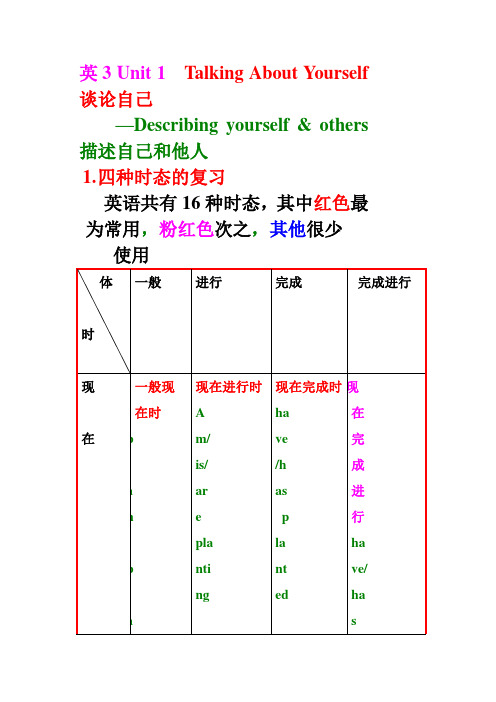
英3 Unit 1 Talking About Yourself 谈论自己—Describing yourself & others 描述自己和他人1.四种时态的复习英语共有16种时态,其中红色最为常用,粉红色次之,其他很少使用①一般现在时(谈论经常性/习惯性的动作/客观事实和真理)I drive to work regularly. 动词原形/三单+s/esHe comes from Liverpool. Light travels faster than sound.②现在进行时(现在正在发生/现阶段正在进行而此刻不一定进行的动作)am/is /are +动词-ingI am writing to enquire about prices. (此刻)She is writing a novel currently.(现阶段)注:状态动词通常不用于进行时态,这类动词多与感官/情感/思维活动有关be hear see smell闻起来soundfeel摸起来taste 尝起来like love hate want believe knowunderstand think③一般过去时(过去某一时间/一段时期内发生的事件/动作)动词+ed /不规则vOn the day of the World Cup, at2:00 my mother went back towork. 在世界杯赛的那天,我妈妈两点钟回去上班了。
When I was a little girl, mybrothers & I collected stamps formany years. 小时候,我和哥哥集邮集了好多年。
④过去进行时(描述过去某一时刻/阶段正在进行的动作)was/were +动词-ingWe were very excited because England were playing West Germany in the final.我们当时非常兴奋,因为在决赛中英格兰队对阵西德队。
开放英语3导学材料
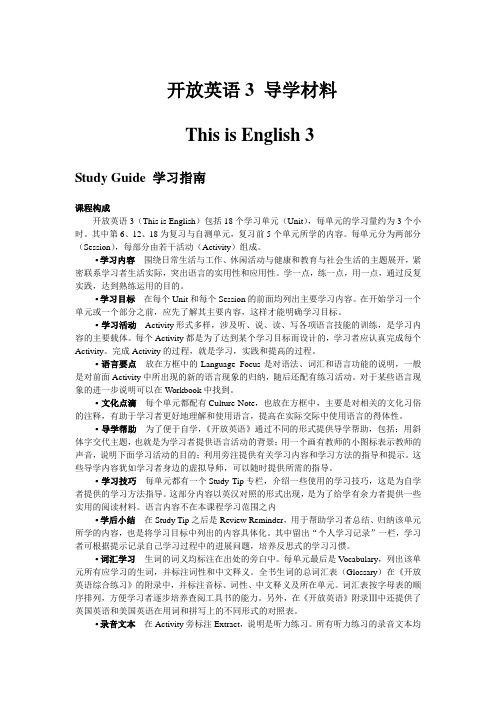
开放英语3 导学材料This is English 3Study Guide 学习指南课程构成开放英语3(This is English)包括18个学习单元(Unit),每单元的学习量约为3个小时。
其中第6、12、18为复习与自测单元,复习前5个单元所学的内容。
每单元分为两部分(Session),每部分由若干活动(Activity)组成。
·学习内容围绕日常生活与工作、休闲活动与健康和教育与社会生活的主题展开,紧密联系学习者生活实际,突出语言的实用性和应用性。
学一点,练一点,用一点,通过反复实践,达到熟练运用的目的。
·学习目标在每个Unit和每个Session的前面均列出主要学习内容。
在开始学习一个单元或一个部分之前,应先了解其主要内容,这样才能明确学习目标。
·学习活动Activity形式多样,涉及听、说、读、写各项语言技能的训练,是学习内容的主要载体。
每个Activity都是为了达到某个学习目标而设计的,学习者应认真完成每个Activity。
完成Activity的过程,就是学习,实践和提高的过程。
·语言要点放在方框中的Language Focus是对语法、词汇和语言功能的说明,一般是对前面Activity中所出现的新的语言现象的归纳,随后还配有练习活动。
对于某些语言现象的进一步说明可以在Workbook中找到。
·文化点滴每个单元都配有Culture Note,也放在方框中,主要是对相关的文化习俗的注释,有助于学习者更好地理解和使用语言,提高在实际交际中使用语言的得体性。
·导学帮助为了便于自学,《开放英语》通过不同的形式提供导学帮助,包括:用斜体字交代主题,也就是为学习者提供语言活动的背景;用一个画有教师的小图标表示教师的声音,说明下面学习活动的目的;利用旁注提供有关学习内容和学习方法的指导和提示。
这些导学内容犹如学习者身边的虚拟导师,可以随时提供所需的指导。
开放英语3 (Unit 5)导学课件

Unit 5 Ambitions and Dreams
齐齐哈尔广播电视大学 主讲教师:钱东瑶
1
Objectives
In this unit you study language relating to personality
and jobs; learn how to use the past perfect tense; learn to talk about jobs and careers; practise talking about the future in the
The boy said that he had never done such a bad thing. (never do 在 say 之前)
7
Exercise (P. 78 Activity 1)
Complete sentences using the words given.
yacht 游艇,快艇 ballet dancer 芭蕾舞演员
2. Later she made a very long __jo_u_r_n_e_y__
around the world.
3. She decided __t_o__ta_k_e_p_a_r_t_in___ a race from
England to Australia and back again.
3
Language Focus (1) (P. 81)
过去完成时 1.构成:
肯定句 (had + 动词过去分词): By the end of last month we had/ we'd studied four units.
第三版大学英语第三册PPT Unit 1

Before Reading
Global Reading
Detailed Reading
After Reading
Around the world or around the block Everywhere I go the kids wanna rock
Get me my DJ I’ve got something he’s gotta play Wanna hear it I can’t wait So turn it up, turn it up … Kick down the barricades Listen what the kids say From time to time people change their minds But the music is here to stay I’ve seen it all from the bottom to the top Everywhere I go the kids wanna rock
Before Reading
Global Reading
Detailed Reading
After Reading
Richmond upon Thames
Richmond upon Thames is a borough of Greater London in southwestern England. Richmond upon Thames is an attractive residential district that borders both sides of the River Thames for about 19 km (about 12 miles). Its population is over 160,000. Among the borough’s historical sites are Hampton Court Palace, the former home of King Henry VIII; and the remains of Richmond Palace, which was used by Queen Elizabeth I. The Royal Botanical Gardens in nearby Kew are also a popular attraction.
开放英语3

3. 谈论性格与职业
She likes taking responsibility. She has a good eye for detail. She prefers working on her own to working in teams. She is intelligent and dynamic.
3. 表示将来的时间状语 the day after tomorrow Tuesday week a week tomorrow in three years’time 4. 用here,there及one避免重复 及 避免重复 I am writing to you from Rio.We’ve been here since Sunday. I was in Italy and when I was there I went to Vatican Museum. I took a trip on a sailing boat yesterday. I have never been on one before.
2. 现在完成时 There have been changes in all sorts of different areas of British society. In recent years in the UK we have had a very large increase in the number of couples who get divorced. 3. 连接词but和so 连接词but和 There has been a steady rise in production, but we have not employed more staff. There has been a steady rise in production, so we have employed.
开放英语3教案Unit 1(朱明zhubob
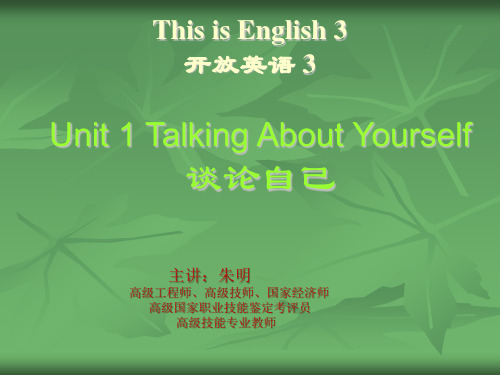
Vocห้องสมุดไป่ตู้bulary (P18)
appropriate: a. 合适的 be available for sth. 有空做某事
eg: I am available for an interview at any time.
He is not available for the job. be over the moon: very happy 快活极了
journalism: n. 新闻学 look back: 回顾 manufacture: n. &v. made 制造 particularly: adv. 尤其,特别 period: n. 时期 placement: n. 安置,放置 product: n. 产品;produce v. 生产 purchase: vt. / n. 购买
eg: She is over the moon about her new baby. burst: v. (使) 破裂,(使)爆炸;burst-burst,
burst in 突然出现
eg: As we burst in, my mother was standing behind the counter. connection:n. 关系,联系 connect: v. 连接 consideration: n.考虑,体谅 consider: v.考虑
生) I am hoping to … 我希望……(表示动作正在发生) I am looking for 我正在寻找……(表示动作正在发生) I am staying… 我暂住…… apply: v. 申请 application look forward to doing: 盼望
可能性 • sport desk 体育编辑部(note 2) • hear from: 收到……的信息(特指信件)
《开放英语3》课程教学辅导(完整版)

《开放英语3》课程教学辅导(完整版)UNIT1:Talk About Yourself一、New words and Expressions:be relevant to 与……相关 be available for sth 有空做某事a full range of各个种类的 take on 聘用prefer…to…与……相比更喜欢 in one’s spare time 在某人业余时burst in 突然出现 be over the moon 快活极了look back 回顾 bring up 抚养tell off 责备 come along(with) 跟着一起来set out (for) 出发(去) try out 试验be in love (with) 爱恋某人 move out of…to…从…搬到…call in on (sb)拜访 make a cup of tea 沏杯茶poke one’s nose into sb’sbusiness 探听某人的事情put up with 容忍 go down 下降move about 走来走去 be proud of 为……感到自豪now and again 不时的 keep in touch 保持联系along with 连同……一起 be born to 出生于split up 离婚,分开 carry on 继续hand over sth to sb把(某物)移交(给某人)to do sth till one drops 做某事直到撑不住为止do some sightseeing 观光 lose one’s job 失业care about 在意 by chance 偶然,碰巧to be honest 说实话 drop sb off 使(某人)下车break one’s leg 摔断腿 in one’s opinion 某人认为in other people’s eyes 在别人眼里be aware of 知道,意识到 make an appointment 预约as soon as possible 尽快 take responsibility 承担责任二、Language Focus:1、一般现在时:I usually drive to work.2、现在进行时:They are watching TV at the moment.3、一般过去时:He was late for work yesterday.4、过去进行时:As we were watching TV,the postman arrived.5、连接句子:He didn’t go to school yesterday because he was ill.6、used to do sth与be/get used to doing sth的区别使用eg.(1) I used to talk to everyone a lot,but now we communicate by email most of the time.(2) Did you get used to writing email?三、Topic:Describing yourself and others交际用语1(1)问候:Hello/Hi.Good morning/afternoon/evening, etc.(2)告辞I'm afraid I must be going now.I think it's time for us to leave now.I've really got to go now.It's time I went home.(3)告别Good-bye/Bye/Bye-bye.Good night.See you tomorrow.(4)介绍A. This is Tom (and this is Amy).I'd like you to meet Mary.May I introduce (you to) Mr./Mrs./ Miss/Ms. Smith?B. How do you do?Glad to meet you.Nice meeting you, Fred.(5)感谢和应答A. Thank you (very much).(Many ) thanks.I'm really gratefu·to you for your help. (6)祝愿和祝贺A. Good luck!Best wishes for your holiday.Have a good time.Please give my best wishes to Linda.Please remember me to your family.B. Congratulations (on your success).(7) 道歉和应答A. Sorry.Excuse me.B. Never mind.It doesn't matter.That's nothing.(8)邀请和应答A. Come in and have a cup of tea.What about having a drink?Would you like some ice cream?B. Thank you (very much).Yes, I'd love to.That's very kind of you, (but I'm on a diet)(9)提议、接受和谢绝A. Can I help you?Is there anything I can do for you?Shal·I carry the box for you?B. Yes, please.No, thank you (just the same).That's very kind of you, but I can manage it myself.(10)开始和结束谈话Nice day, isn't it?What a lovely day today!UNIT 2 Family Influences一、New words and Expressions:tell off 责备 come along(with) 跟着一起来set out (for) 出发(去) try out 试验be in love (with) 爱恋某人 move out of…to…从…搬到…call in on (sb)拜访 make a cup of tea 沏杯茶poke one’s nose into sb’sbusiness 探听某人的事情put up with 容忍 go down 下降move about 走来走去 be proud of 为……感到自豪二、Language Focus:1、一般过去时被动语态:She was seen first by the local doctors.2、短语动词:to bring sb up,to put up with sb,to take after sb3、used to/would(1)My brother never used to come to the fair with us.(2)I would invite some friends to come along with me.4、always/forever/to keep doing sth的区别使用:He’s forever checking his hair in the mirror.5、doing用于描述行为:She keeps phoning up to see if I am getting better.三、Topic:Describing your family and family relationships交际用语2(1)请求重复和解释Uh, excuse me, could you repeat it?Could you say that again?(2)定义Linguistics may be defined as the science of language.(3)确认理解Got it?Do you see what I mean?(4)犹豫Let me see.How can I put it?(5)更正What I meant was that we should go on with the work.(6)补充In addition, I think we should take the cost into account.(7)插话Excuse me. Did you say that the party had to be put off?(8)意愿I'm willing/ready to take the job.I wil·buy a new pair of glasses.(9)希望I wish to see you again.I hope you wil·get better soon.I wish I were younger.(10)意向I'm planning to move somewhere downtown.I fee·like taking a hot bath now.(11)责任Do I have to finish it today?Should I look after the baby this evening?Is it necessary for me to clean the room?I'm afraid you must/wil·have to stay home. (12)能力I can manage the job without help.I'm capable of running a mile in four minutes. (13)允许A. I wonder if I could possibly use your bicycle?B. Sure, go ahead.C. I'd rather you didn't.(14)同意和不同意A. That's a good point.B. I'm afraid you're not quite right. (15)喜欢和不喜欢A. I like English poems very much.She loves doing shopping alone.B. He doesn't like wearing his hair long.I don't care much for hot food.(16)偏爱I prefer tea to coffee.I'd rather go by train than by plane. (17)原谅It's not your fault.Please don't blame yourself.(18)后悔I should have finished my essay earlier. (19)慰问和同情I'm so sorry.Please accept my deep sympathy.(20)兴趣That's quite tempting.I'm curious about that.(21)决心She's determined to go to Australia.I insist everybody be here at six sharp.Nothing wil·prevent me from accomplishing the task. (22)责怪和批评You are late again.Why didn't you tel·me the truth?You shouldn't have done that.(23)抱怨I hate to have to say this, but it's too noisy here. (24)否定I don't think you are right.(25)让步Even so/But it's still a fact.(26)怀疑I doubt if we can finish it on time.I suspect the truth of her statement.(27)犹豫Well, let me see.(28)坚持But you know that she's innocent.(29)忍受Well, we just have to accept that sort of thing.(30)冷淡I don't care what you do.It doesn't matter to me.UNIT 3 Society and Family Life一、New words and Expressions:now and again 不时的 keep in touch 保持联系along with 连同……一起 be born to 出生于split up 离婚,分开 carry on 继续hand over sth to sb把(某物)移交(给某人)to do sth till one drops 做某事直到撑不住为止二、Language Focus:1、描述趋势 nouns/serbs:rise,fall,etc.adjectives:sharp,slow,etc. adverbs:sharply,slowly,etc.2、现在完成时 The minimum wage has increased,but it is not enoughto stop poverty.3、But/so There has been a steady rise in production,so we haveemployed more staff.4、描述习惯 She goes to the hairdresser’s once a month.5、描述关系 to fall in love with sb ,to get on(well)with sb.三、Topic:Talking about changes in the family and society 谈论家庭与社会的变化交际用语3(1)肯定和不肯定I'm not quite sure whether it wil·rain today.(2)可能和不可能It is possible that he is out.It is unlikely that he should be at home. (3)预测It will be fine tomorrow.(4)猜测和相信I guess that he has got it.He must have read it before.We al·believe that you are right.(5)看似、好象He seems to be ignorant about it.She appears to be unwilling to go.It looks as if he knew a lot about it.交际用语4(1)惊奇What a surprise!I can hardly believe my ears/eyes.(2)满意和高兴It is wel·done.I'm pleased to know that.How wonderful!(3)愤怒或恼怒Isn't it annoying/irritating!What a stupid idiot!(4)悲伤Oh, no! How could this happen to me?I can't take much more of this.(5)愿望I wish I were young again.(6)悔恨和失望Oh, what a pity /shame!That's too bad.(7)需求I need your help.I want you to read this report.(8)焦虑I'm so anxious about my job.She is rather worried about his health. (9)加重感情色彩What a wonderfu·day!Thank you ever so much.It is far, far too expensive.(10)担心和挂念I'm so worried about you.She is anxious to know the result.(11)害怕Don't be afraid.I was frightened to death when a tal·man ran towards me.(12)期望I'm expecting a call.(13)赞赏What a marvelous play!I like your haircut.《开放英语Ⅱ(1)》UNIT 1—UNIT 3语法练习《开放英语3》Unit 1—Unit 3单元主要复习了各种学过的时态:一般现在时、现在进行时、一般过去时、过去进行时、现在完成时以及一般过去时的被动语态形式。
导学课

四 英语Ⅱ(1) 定语从句
• 关于定语从句也是复习内容,大家主要要区 别定语从句中关系代词who, which, that, whose 的使用情况我们一起来看一些例子: • He talked to Mr. White who / that was the chairman of the committee. • The book which / that you are reading is written by Mark Twain. • A teacher is a person whose duty is to teach
• 河南省电大网上教学资源
登陆河南省广播电视大学主页---河南电大在线---课程性质和特点 登陆电大在线-----输入学号密码----选择本科专业--选择英语II (1)课程
13
课程性质和特点
• 英语II (1)是中央广播电视大学开放教育公共英语课程,供 各类专业(不含英语专业)的本科学生学习。本课程课内 总学时为54学时,每周3个学时,一学期完成。共3学分。课 程教学进度为每周学习一个单元(Unit), 共18个单元,18 周完成。 • 遵循中央电大开放教育的改革思路,这门课程的教学设计 突出课程的开放性,教学内容在选材上更注重语言材料的 真实性, 贴近生活,富有时代气息,内容集知识性、趣味 性与思想性为一体,比较适合成人自主学习。
1
导学课
This Is English 3
新乡电大英语教研室 张宁
2
目录
学习本课程意义 本课程基本情况 本课程学习方法 本课程章节介绍
目录
3
一 学习本课程意义
4
5
6
7
二
本课程 基本情况
朱明zhubob-开放英语3 - unit1

This is English 3张滢必修,统设,3学分18 units6,12,18 units: review复习Assessment 测验15 units12 weeks教材:开放英语3+形成性考核作业册考试Unit 3 society 社会andFamily 家庭lifeActivity 活动,练习A day in the life of aCare 照顾,关注= look afterCare for-(e)r 人:照顾老人的人P43Activity 11P42, activity 101.Lily – the writer2.Jack p段落最后、5 L 行2The writer’s next door neighbour3.Tilly: P1/L2,the writer’s mother4.Syd: P4/L1,the writer’s brother5.May: P3/L4, the writer’s anotherFriend, who lives in town6.Joan:P3/L3, the writer’s friendAnd neighbour7.Sally: P5/L1,the nurseP1/L1:Lily wakes 醒来before her mother. Until 直到, TP1/L4Her mother has breakfast in bed?. She gets up 起床 out of bedFP3/L4/L2,Lily goes to the town every week? .I can go…who lives in town. F. Joan sometimes =now and again 偶尔spends the day With Lily’s mother. TP4,L1Lily’s brother comes to visit/stay Every three weeks. FTwo or three times a year.P5/L1Sally visits=comes to seeTilly regularly 定期地,有时Lily is always happy with the situation 情况,情形.Feel 感觉P5/L4Trapped 被困的,受牵制的FLily and her mother sometimes偶尔 play cardsMore than they usually 经常watch TV. P5,L2Lily is (70 years old)表语Take-s care of 照顾,照看=Care forAbout 介词,必须接名词、-ing作为宾语Car-ing(91-year-old) 定语mother连接符号,构成一个独立的单词失去复数形式Told: tell 告诉,过去式6six.30thirtyHalf past sixAm 上午Pm 下午Until 构成时间状语从句,表示主句动作一直持续到从句动作为止Wait …hearMum=mom, motherMove about 副词= around 四周Normally 一般情况下Sunday-s 表示所有Read-sSit by 介词,靠着,挨着Wave 招手As 构成时间状语从句,同时性的动作,waves …walk by 副词,路过Hardly 几乎不= almost notEver 曾经Proud of 自豪,骄傲Personal 自己的,个人的Appear 出现-Ance 构成抽象名词,外表,外貌=lookHair-dress-er 人,美发师Once 一次Twice 两次,two timesThree times 三次Like 喜欢 + -ingBe-ing 是 left(leave 过去分词)Leave 遗留,拉下,放任放着不管On one’s own 独自地=alone Arrange 安排Keep 保持in Touch 联系Collect =pick up 接受Like go –ingJourney =travelNext-doorCall in 登门造访=visit Fantastic =wonderful,very good Spontaneously 即兴地,随时随地Vs plan 计划性Alter 改变=changeAlter-native 改变性的;可选择的改变;选择表示动作发生的频度Once/twice/three times a week/ Every week/monthOccasionally 偶尔,有时Now and again 偶尔,有时Usually 经常,通常Always 永远,经常,总是Never 从不Regularly 定期地,偶尔,有时Often 经常Not often 不经常,很少,极少Sometimes 偶尔,有时Hardly ever 几乎不,很少,极少From time to time 有时,偶尔描述现在重复性,习惯性动作使用一般现在时,通过动词变化表现Be 静止动词,动作保持不变,是,am/is/are行为动词-sLily/Sally/JoanWake-s; has(have) ; goes(go) Spend-s;come-s; visit-s;is(be)-o+es: do-es辅音字母+y, -i+esTry: Triess/sh/ch/x-espass-es; fix-es; teach-es; brush-esp2 – Activity 2Activity 3-P41.Applying 申请(职位)to卫士guardian 护卫P2/L3 Liverpool Echo 共鸣2.Liverpool P2/L2 UniversityDuring 在。
【原创】导学案:必修3 Unit 1
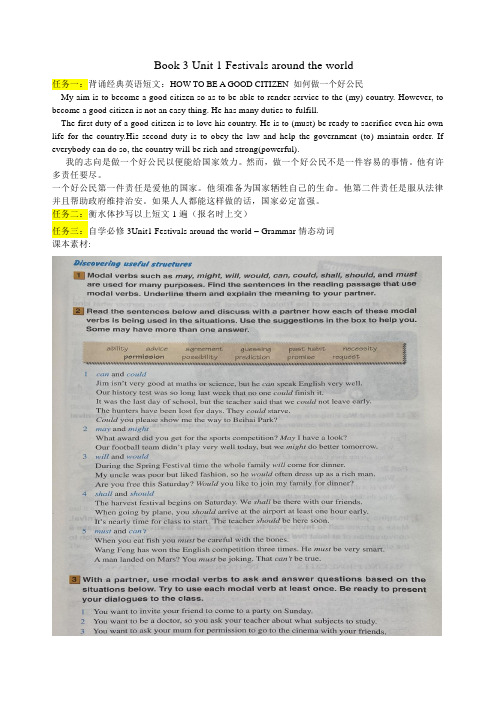
Book 3 Unit 1 Festivals around the world任务一:背诵经典英语短文:HOW TO BE A GOOD CITIZEN 如何做一个好公民My aim is to become a good citizen so as to be able to render service to the (my) country. However, to become a good citizen is not an easy thing. He has many duties to fulfill.The first duty of a good citizen is to love his country. He is to (must) be ready to sacrifice even his own life for the country.His second duty is to obey the law and help the government (to) maintain order. If everybody can do so, the country will be rich and strong(powerful).我的志向是做一个好公民以便能给国家效力。
然而,做一个好公民不是一件容易的事情。
他有许多责任要尽。
一个好公民第一件责任是爱他的国家。
他须准备为国家牺牲自己的生命。
他第二件责任是服从法律并且帮助政府维持治安。
如果人人都能这样做的话,国家必定富强。
任务二:衡水体抄写以上短文1遍(报名时上交)任务三:自学必修3Unit1 Festivals around the world – Grammar情态动词课本素材:导学案:Book 3 Unit 1 Festivals around the worldPeriod 5 Grammar—Modal verbs (预习导学案)预习目标:Read the following explanations for modal verbs carefully and know their different usages.I. 情态动词的语法特征1) 情态动词不能单独做谓语, 除ought和have外, 后面只能接不带to的不定式。
开放英语3Unit 1 Talking Aboout Yoursself 谈论自己
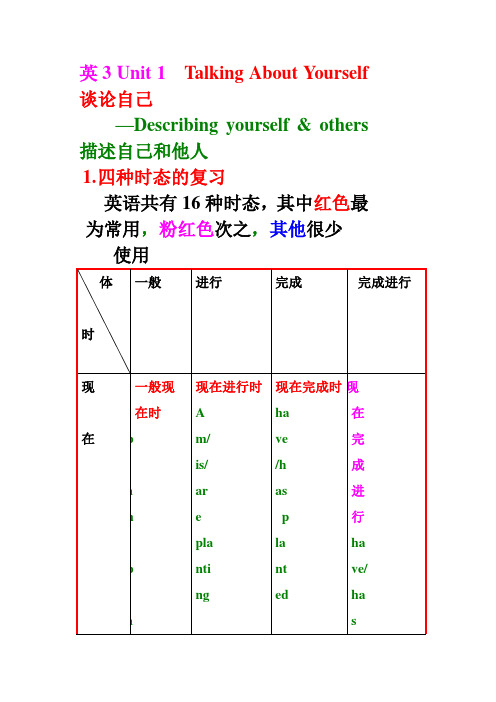
英3 Unit 1 Talking About Yourself 谈论自己—Describing yourself & others 描述自己和他人1.四种时态的复习英语共有16种时态,其中红色最为常用,粉红色次之,其他很少使用①一般现在时(谈论经常性/习惯性的动作/客观事实和真理)I drive to work regularly. 动词原形/三单+s/esHe comes from Liverpool. Light travels faster than sound.②现在进行时(现在正在发生/现阶段正在进行而此刻不一定进行的动作)am/is /are +动词-ingI am writing to enquire about prices. (此刻)She is writing a novel currently.(现阶段)注:状态动词通常不用于进行时态,这类动词多与感官/情感/思维活动有关be hear see smell闻起来soundfeel摸起来taste 尝起来like love hate want believe knowunderstand think③一般过去时(过去某一时间/一段时期内发生的事件/动作)动词+ed /不规则vOn the day of the World Cup, at2:00 my mother went back towork. 在世界杯赛的那天,我妈妈两点钟回去上班了。
When I was a little girl, mybrothers & I collected stamps formany years. 小时候,我和哥哥集邮集了好多年。
④过去进行时(描述过去某一时刻/阶段正在进行的动作)was/were +动词-ingWe were very excited because England were playing West Germany in the final.我们当时非常兴奋,因为在决赛中英格兰队对阵西德队。
- 1、下载文档前请自行甄别文档内容的完整性,平台不提供额外的编辑、内容补充、找答案等附加服务。
- 2、"仅部分预览"的文档,不可在线预览部分如存在完整性等问题,可反馈申请退款(可完整预览的文档不适用该条件!)。
- 3、如文档侵犯您的权益,请联系客服反馈,我们会尽快为您处理(人工客服工作时间:9:00-18:30)。
Text
(P. 2 Activity 2)
6. grow up 长大 Bob was born in England, but he grew up in Australia. 7. apart from 除了 之外 除了… They all arrived on time apart from Tim who was late as usual. 8. work on 对…做工作 做工作 I am currently working on a new software system. 9. look for 寻找 I’m looking for my door key, but I can’t find it anywhere. 10. be available for 有空做某事 He is not available for the job. 11. look forward to (sth. or doing sth.) 盼望,期待 盼望, We look forward to your early reply. 10
5
Exercise
1. I work for my brother 2. I’m working for my brother 3. I study 4. I’m studying 5. I do 6. I’m doing 7. I buy a new car 8. I’m buying a new car 9. I use a computer 6 10. I’m using a computer
stolen.
g. every day after dinner. h. the shopping at the
weekends.
i. because his shop is very busy at the moment.
Exercise
Question Word words 1. Where 2. How name? 3. How often 4. Where month? 5. What 6. Who 7. Where 8. theatre? 7 9. Auxiliary do do does are does do is Do Are
(P. 5 Activity 5)
Subject you you he you Verb live? spell go staying Other
your there? this
“logical” mean? you work for? he waiting now? you like the they sitting in the
b. accountancy. c. Mary Martin. d. a new software system. e. walking with my dogs. f. London University. g. a Finance Director. h. Birmingham. i. go to the countryside. j. a bus driver.
Language Focus (1) 4)
(P.
注意:以下状态动词通常不用进行时态。 注意:以下状态动词通常不用进行时态。 状态动词通常不用进行时态
to be, to have (“有”),to belong, to seem, to 有 , need to hear, to see, to smell, to sound, to feel, to taste to like, to love, to want, to enjoy, to prefer, to hate to believe, to know, to think (认为 to 认为), 认为 understand, to suppose, to mean, to realize, to remember, to forget
11
Exercise
(P. 7 Activity 7)
a. Coventry, England, in
1955.
1. My name is ( c ) 2. I was born in ( a ) 3. My father worked as( j ) 4. I studied ( b ) 5. I studied at ( f ) 6. I am ( g ) 7. I live in ( h ) 8. I am currently working on( d ) 9. In my spare time I like( e ) ( 10. At the weekends I often i ) 12
Session 2
In this session ,you revise the simple past and continuous past; revise the expression used to to describe past activities; practise linking sentences using pronouns and, but and with.
Reading Comprehension
(P. 4 Activity 3)
1. (F). John Wilkes isn’t applying to the Manchester Guardian. He is applying to the Liverpool Echo. 2. (F). John Wilkes doesn’t usually stay in Lancaster during the vacations. He usually stays in Liverpool during the vacations. 3. (T). 4. (F). He isn’t writing an article about “Women in Snooker”. He is writing an article about Bill Shankley’s influence on Liverpool football. 5. (F). He doesn’t have a publisher for his article on Bill Shankley. He is currently looking for a newspaper to publish it. 6. (T).
2
Session 1
In this session ,you revise the simple and continuous present; learn to use vocabulary for leisure and studies.
3
Language Focus (1)
(P. 4)
4
1. 复习一般现在时 How often do you play football? My daughter sings very well. Mary gets up at six every morning. Nurses look after patients in hospitals. 2. 复习现在进行时 Please don’t make so much noise. I’m studying. Let’s stay at home. It’s raining outside. David is teaching English and learning Chinese in Beijing.
Writing
(P. 8 Activity 9)
List of Occupations
engineer工程师, worker工人, farmer农民, teacher教师, doctor医生, nurse护士, secretary秘书, lawyer律师, writer 作家, clerk职员, bank clerk银行职员, airline clerk航空公司 干事, sales clerk营业员, accountant会计, cashier出纳, technician 技 术 员 , electrician 电 工 , policeman 女 警 察 , policewoman男警察, waiter男招待, waitress女招待, salesman商人, editor编辑, shop assistant商店售货员, receptionist接待员, civil servant公务员, computer programmer电脑程序员, artist艺术家, designer设计师, housewife家庭主妇, manager经理, deputy manager副经理, hair stylist美发师, librarian 图书馆管理员,lecturer (大学)讲师 14
(P. 5 Activity 4)
a. for my final exam. b. a job placement at the
moment.
c. at work every day. d. in his shop. e. but I usually write by hand. f. because my old one was
This is English 3
Unit 1 Talking About yourself
齐齐哈尔广播电视大学 主讲教师:钱东瑶
1
Objectives
In this unit , you study vocabulary related to work, leisure and studies; revise the simple and continuous present and past tenses; revise the expression used to to describe habitual past activities; practise writing by using linking words and pronouns.
